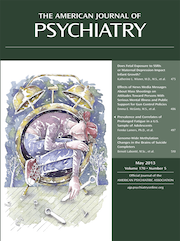The Enigmatic Persistence of Anorexia Nervosa
Abstract
Objective
In this review, based on recent advances in cognitive neuroscience, the author presents a formulation in which the marked persistence of anorexia nervosa can be usefully understood as a well-ingrained maladaptive habit.
Method
The author reviewed the relevant literature on the development and course of anorexia nervosa and interpreted critical features in light of developments in cognitive neuroscience.
Results
Anorexia nervosa is a well characterized disorder with remarkable persistence both across history and among affected individuals. Food restriction, the salient behavioral feature of the disorder, often begins innocently but gradually takes on a life of its own. Over time, it becomes highly entrenched and resistant to change through either psychological or pharmacological treatment. Cognitive neuroscience has described two related but distinct processes that underlie the acquisition of new patterns of behavior, namely, action-outcome and stimulus-response learning. It is likely that both processes are engaged in the development of anorexia nervosa and that stimulus-response learning (that is, habit formation) is critical to the persistence of the dieting behavior.
Conclusions
The formulation of the dieting behavior characteristic of anorexia nervosa as a well-entrenched habit provides a basis for understanding the striking persistence of this disorder. This model helps explain the resistance of anorexia nervosa to interventions that have established efficacy in related disorders and implies that addressing the dieting behavior is critical, especially early in the course of the illness, before it has become ingrained.



